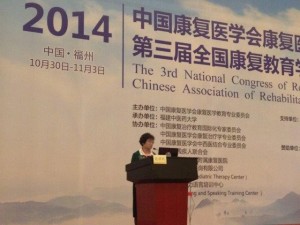
Dr. Ao LiJuan, CARM Vice Chair and Olivia’s Place Technical Advisory Board Member, gives the opening presentation for the 2014 CARM conference in Fuzhou.
During 30th October – 3rd November 3 2014, the Chinese Association of Rehabilitation Medicine (CARM) held their nationwide conference on the rehabilitation/therapy field’s education and training in FuZhou (FuJian Province). Overall, the conference was quite successful, both for the rehabilitation and therapy fields of China, and for Olivia’s Place.
In total, 8 conference speakers attended via our introduction or initiation:
- Dr. Jean Deitz, Professor Emeritus, OT Department, University of Washington , Olivia’s Place Technical Advisory Board Member
- Dr. Sharon Demuth, Professor, PT Department, University of Southern California, Olivia’s Place Technical Advisory Board Member
- Guy Djoken, Chairman of UNESCO (United Nations Education/Science/Culture Organization) Clubs and Executive Director of UNESCO Center for Peace
- Dr. April Gamble (DPT), Eliott’s Corner Physical Therapist
- Wendy Lee, Adjunct Professor, University of Texas, Dallas and Program Manager, Bethel Speech & Hearing
- Dr. Henry Lew, Professor and Chair, Department of Communication Sciences and Disorders University of Hawaii, Olivia’s Place Technical Advisory Board Member
- Dr. Lucy Liu, Adjunct Professor, University of Texas, Dallas & Chief Research Officer, Bethel Speech & Hearing
- Dr. Margaret Rogers, Chief Staff Officer for Science and Research, American Speech-Language Hearning Association (ASHA)
The leadership for CARM, as well as the heads of major Chinese universities and medical schools were present. Also in attendance was leadership from the World Federation of Occupational Therapists (WFOT) and the World Confederation for Physical Therapy (WCPT), along with experts from universities in Australia, Hong Kong, Taiwan, and the United States. Overall, the conference demonstrated how seriously China is looking at the gap that exists in training and qualifying the millions of therapists needed as China continues to build out rehabilitation and therapy infrastructure over the next five to ten years. Dr. Henry Lew noted this following his recent visit to China, saying he was “glad to see that the rehabilitation professionals in China are embracing the concept and implementation of evidence based practice (EBP).”
Before the conference, a multi-day nationwide student clinical competition was held. Students from all over China worked in university teams to assess and treat cases using standardized patients before an audience of judges, faculty, and experts. Prizes were awarded to the top scoring teams from the competition. Dr. Jean Dietz, who assisted with this competition, commented that she was “charmed by the conscientious, enthusiastic students who participated in the OT/PT skills contest” and believes that “these students will help to define the future.”
The international panel of speakers presented on accreditation systems, faculty training, curriculum development, among other topics. The need for degree programs in Chinese medical schools and universities and the need to establish credentialing and accreditation programs were both highlighted as key conference conclusions. With respect to the latter, these programs should not just be about testing, but also to increase training for existing rehab specialists in order to strengthen their professional level to international standards. Dr. Sharon Demuth reflected that it is “important that bachelors level programs for the education of physical and occupational therapists are being developed. And it will be very critical for the future of our professions in China that those programs are successful in getting recognition for discipline specific education as well as support for educating and employing the large number of physical and occupational therapists that China requires. Having model programs like Olivia’s Place and Elliot’s Corner to turn to, especially when it comes to the provision of clinical education for therapists in pediatric physical therapy will help faculty in those university based programs with appropriate educational goals and objectives.”
Reflecting on the conference, Dr. Dietz was “impressed by the people I met and their commitment to individuals with disabilities and to strengthening rehabilitation in China. She “witnessed an energetic network of people working together and drawing on both national and international resources in order to build strong rehabilitation education and service delivery programs.” Olivia’s Place was honored to be able to support CARM and to host several international experts in their fields in keeping with our mission to promote high quality pediatric therapy in China. We consider these experts true friends of Olivia’s Place and of the field of rehabilitation in China. We were touched by Dr. Dietz’ comments about her trip to China, where she visited both Fuzhou and Shanghai, “I loved and appreciated all of the opportunities I had to interact with people in China, especially those at Olivia’s Place and SHINE Academy. Nelson, Quynh, and their children, and the staff and therapists were so welcoming. It felt like being in a warm family. “




